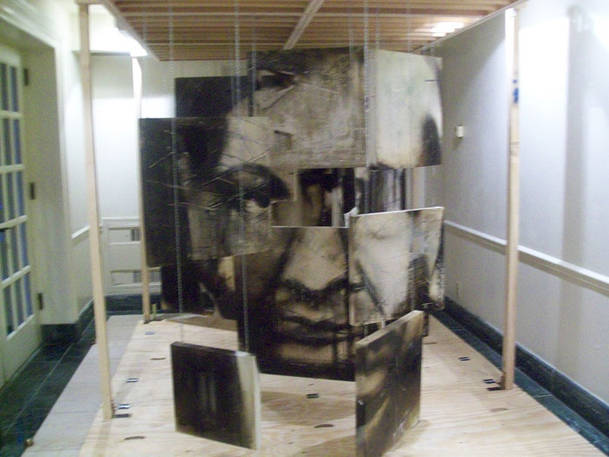


The genius, the philosophical intuitions, the enigmatic style of Giorgio De Chirico have influenced entire generations of painters and sculptors, determining currents like Magritte’s surrealism or touching the lives of friends and artists, from Guttuso [2] to Seward Johnson [3], who were close to him. These latter have then created their own works, re-interpreting their “master”, either imitating, or paying homage to a painting, or portraying or adapting his most important teachings and concepts.
Curators Gloria and Antonio Porcella have collected the works of 67 artists to set up an exhibit that was brought to the United States for the first time with the collaboration of Claudio Angelini, President of the Dante Alighieri Society [4] who, just like his father, had Giorgio De Chirico as his best-man at his wedding. Besides New York, the work will also be displayed in Miami and Los Angeles.
Some of De Chirico’s masterpieces are permanently displayed in some of NY's major museums, including the MOMA. The artist himself had a particular bond with this city that resulted from a combination of his philosophical ideas and his artistic mission.
When De Chirico came to the Big Apple for the first time he wrote some personal notes, collected in various books: “While walking on the streets of New York, I felt like I was lifted up and I could fly, as it normally happens only in dreams up until a certain age; I was carried up to balconies or skyscrapers that were both vertiginous and romantic” (…) “In this city metaphysics are displayed in the architecture”. “The skyscrapers that surround me stand as the houses in The Enigma of An Autumn Afternoon”. He also cleverly noted that in English what in Italian is called “natura morta” (dead nature) is translated as “still life”.
These feelings somehow enlighted his Art. That is why his portraits and the works inspired by him - sometimes very similar to his actual paintings - feel somehow at home when brought to the "other side of the pond", in the somewhat decadent and yet statuary buildings of the Greenwich Village, at Casa Italiana,Zerilli-Marim [5]ò, the center for Italian Studies and Culture at New York University.
At the opening of the exhibit in New York, at the “Casa”, on February 17, the curators were present as well as Mr Angiolini, together with interested guests and some of the artists themselves, such as Francesca Leone (daughter of director Sergio Leone).
The night of the inauguration the beautiful hallways of the Casa, where the exhibit was displayed, were crowded with poeple admiring the works while sipping some excellent wine. On the walls, pieces of art of Enrico Prampolini, Renato Guttuso, Ruggero Savinio [6], Gino Marotta [7], Ennio Calabria [8], Sergio Vacchi [9], Mario Ceroli [10], Alberto Sughi [11], Bruno Ceccobelli [12], Piero Pizzi Cannella [13], Bruno Grassi [14], Marco Nereo Rotell [15]i, Jean Pierre Duriez [16], Alfredo Rapetti [17], Erika Calesini [18], Angelo Colagrossi [19], Stefano Branca [20], Irem Inceday [21], Flavia Mantovan [22], Camilla Ancilotto [23], Isabella Orsini [24], Francesca Leone [25], Cristiano Cascelli [26], Pino Settanni [27], Tiziano Lucci [28] and Fabiana Roscioli [29].
All kind of techniques and styles are used in order to pay homage to De Chirico: from traditional oil portraits and sculptures to holographic projections.
We spent some time with curator Gloria Porcelli who told us about the story of the exhibit: “My father first set it at the Ca D’Oro [30] gallery in Rome in 1975, when De Chirico was still alive. The second edition of the exhibit was held in 2008, 120 years after the artist's birth and 30 after his death. This “American tour”, was finally presented by Gianni Alemanno, mayor of Rome, at the Capitoline Hill.”
“De Chirico has influenced a variety of artists from all over the world. Some of the art displayed here was sold in auctions, other pieces are part of the private collection of friends of ours, and another fiew were created just for the occasion. Pieces by some oh his "historical disciples", among which Prampolini [31], Guttuso or Clerici, are thus displayed besides those by young, less known artists.
Works by Savinio and Gino Marotta, who were very close to De Chirico, fartherly enrich the exhibit, that also features excerpts of the Letter on Metaphysics as well as a video projection of a documentary on De Chirico produced by RAI, the Italian National Broadcasting System.
Imitation is inspiration but also re-interpretation. The main characteristic of these works is that they keep alive and fairly represent the philosophical undertones and messages of De Chirico’s art. In all of them there is the idea of Metaphysics that explains the “non-meaning” of things, and portraits the need to capture what is beyond the rational illusions of a flowing mind.
De Chirico believed that memory is made of fragments, quotes, objects that are placed next to one another with apparently no connection. While walking around the beautiful rooms of Casa Italiana one feels as if these fragments have been put together and now form a more coherent train of thought, while maintaining the fascination of something complex and beautifully inexplicable.
Source URL: http://newsite.iitaly.org/magazine/focus/art-culture/article/omaggio-de-chirico-artists-inspired-master-surrealism-and
Links
[1] http://newsite.iitaly.org/files/dechcover1267045557jpg
[2] http://www.guttuso.com/
[3] http://www.sewardjohnson.com/site/index.html
[4] http://www.dantenyc.org/
[5] http://www.casaitaliananyu.org/
[6] http://www.visionillusioni.it/mostra/artisti-mostra-visioni-illusioni.php?id=46
[7] http://www.artnet.com/artist/698584/gino-marotta.html
[8] http://www.galleriavirtuale.net/calabria/index.htm
[9] http://www.askart.com/askart/v/sergio_vacchi/sergio_vacchi.aspx
[10] http://www.ceroli.com/
[11] http://www.albertosughi.com/
[12] http://www.brunoceccobelli.com/
[13] http://www.artnet.com/artist/667082/piero-pizzi-cannella.html
[14] http://www.edsart.it/brunograssi/homepage.html
[15] http://www.artnet.com/artist/425288953/marco-nereo-rotelli.html
[16] http://www.i-italy.org/events?filter2=consulate_event
[17] http://www.alfredorapetti.it/
[18] http://www.erikacalesini.it/index.php?action=main&locale=
[19] http://de.wikipedia.org/wiki/Angelo_Colagrossi
[20] http://books.google.com/books?id=QRMRKyDdNccC&pg=PA83&lpg=PA83&dq=stefano+branca+sculpture&source=bl&ots=zVejl_UGpw&sig=tETiWn3w1fECqdHYL1nai-MJ4RI&hl=en&ei=f6GGS4-APITAlAfKqvkg&sa=X&oi=book_result&ct=result&resnum=1&ved=0CAgQ6AEwAA#v=onepage&q=stefano%20branca%20sculpture&f=false
[21] http://www.exibart.com/profilo/autoriv2/persona_view.asp?id=77525
[22] http://theblogpaper.co.uk/art/latest
[23] http://www.camillaancilotto.com/
[24] http://it.wikipedia.org/wiki/Isabella_Orsini
[25] http://www.francescaleone.it/
[26] http://www.zenworld.it/arte_archivio/cascelli.htm
[27] http://www.pinosettanni.it/
[28] http://www.merzbau.it/artisti/tiziano_lucci/index.htm
[29] http://www.fabianaroscioli.it/
[30] http://www.ca-doro.com/
[31] http://www.artcyclopedia.com/artists/prampolini_enrico.html